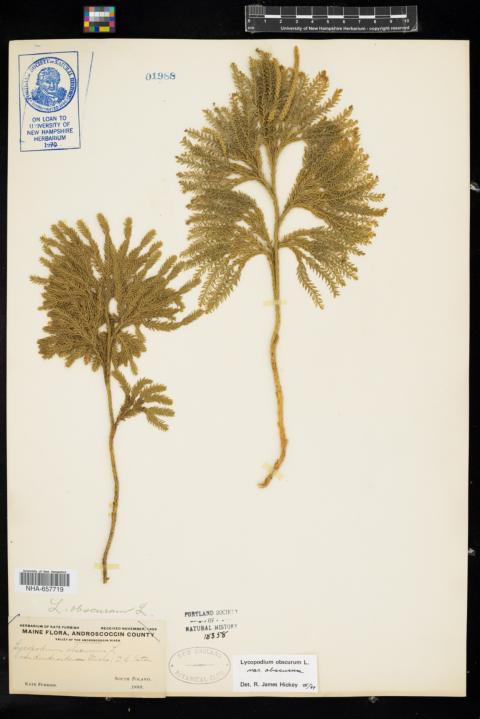
A specimen of Dendrolycopodium obscurum, commonly called rare clubmoss, ground pine or princess pine, from the Albion R. Hodgdon Herbarium at UNH is being featured in the Maine Historical Society's exhibit CODE RED: Climate, Justice & Natural History Collections. The specimen was collected in 1893 by Kate Furbish, a regionally well-known botanist who documented the flora of Maine with herbarium specimens and exquisite watercolors. Furbish's specimens were originally held by the herbaria at Bowdoin College and the Portland Society of Natural History, but many have been transferred to the herbarium at UNH.
“Including herbarium specimens in the CODE RED exhibit speaks to the value of UNH’s Hodgdon Herbarium beyond the physical plant samples,” says Erin Sigel ’03, herbarium collections manager. “They have the power to link the past to the present. Plant specimens collected 100 years ago are now being used to understand climate change, as well the history of exploration and scientific methods. They continue to provide new perspectives on the biodiversity of New England.”
The Hodgdon Herbarium holds at least 162 of Furbish’s collections. Sigel believes that her specimens came to the herbarium when the Portland Society of Natural History was dissolved in 1970. Dr. Albion Hodgdon, the herbarium’s namesake and a renowned specialist on the flora of New England, agreed to “permanently loan" the majority of the PSNH’s 30,000 specimens to UNH, including the Furbish specimens.
CODE RED examines the climate and biodiversity crisis by reuniting selected collections from the Portland Society of Natural History, which headquartered in Portland, Maine for over 135 years. Combined with Maine Historical Society’s historic items and contemporary art, CODE RED aims to spark dialogue about the human effect on global warming. The exhibition delves into American natural history museums, the impact of museum collecting practices, colonialism, exploration and Indigenous Science and Western scientific methods. It also explores Maine’s pivotal role in the environmental movement and how people can channel hope and action to address climate heating, biodiversity loss and eco-anxiety.
The exhibit, which opened on March 17 and runs through December 30, 2023, is located at the Maine Historical Society at 489 Congress Street, Portland, Maine. Learn more, get tickets and plan your visit here.